The world of spirits is as diverse as it is intriguing, with an array of flavors, aromas, and traditions spanning centuries. Among the various types of spirits, vodka stands out for its neutrality and versatility. Yet, there’s a common misconception that all spirits start as vodka. In this article, we delve into the intricacies of distillation to uncover the truth behind this notion.
Understanding Distillation: The Foundation of Spirits Production
At the heart of spirits production lies the process of distillation. Distillation is a method used to separate components of a liquid mixture by heating and cooling, exploiting differences in boiling points. This process is fundamental in creating alcoholic beverages, including vodka. However, do all spirits start as vodka in the distillation process?
Vodka: The Neutral Spirit
Vodka is renowned for its neutral taste and aroma, making it a popular base for cocktails and mixed drinks. Unlike other spirits, such as whiskey or rum, which derive much of their flavor from the ingredients used in fermentation and aging, vodka is typically distilled to a high degree of purity, often multiple times, to remove impurities and flavor compounds. This neutrality allows vodka to serve as a blank canvas for mixologists and distillers alike.
The Myth of Vodka as the Origin of All Spirits
While vodka’s neutrality makes it a versatile base for spirits production, it is not accurate to claim that all spirits start as vodka. The notion likely stems from the fact that many spirits undergo a similar initial distillation process to vodka, where a fermented mash or wash is distilled to produce a high-proof alcohol. However, the subsequent steps in production, such as aging, flavoring, and blending, are what differentiate one spirit from another.
From Grain to Glass: The Journey of Whiskey
Whiskey, a beloved spirit with a rich history, offers a stark contrast to vodka in terms of flavor and character. While some whiskeys may begin with a similar grain base as vodka, such as wheat, rye, or corn, the distillation process and aging in wooden barrels contribute significantly to its distinctive taste profile. Unlike vodka, which is often distilled to a high proof to achieve neutrality, whiskey is typically distilled at lower proofs to preserve the flavors and characteristics of the grains.
Rum: A Taste of the Tropics
Rum, another popular spirit, traces its origins to the sugarcane plantations of the Caribbean. While some varieties of rum may undergo a distillation process akin to vodka, using sugarcane juice or molasses as a base, the similarities end there. The aging process in oak barrels and the tropical climate in which rum is often produced impart unique flavors and complexities not found in vodka.
Gin: Infused with Botanicals
Gin, celebrated for its botanical infusion, undergoes a distinct distillation process that sets it apart from vodka. While both spirits may start with a neutral grain or malt base, gin is infused with a variety of botanicals, including juniper berries, citrus peel, and spices, during or after distillation. These botanicals lend gin its signature flavor profile, ranging from floral and herbaceous to spicy and citrusy, making it a favorite among cocktail enthusiasts.
Brandy: Elegance in a Glass
Brandy, derived from the distillation of wine or fermented fruit mash, offers a refined drinking experience with its nuanced flavors and aromas. Unlike vodka, which is typically distilled from grains or potatoes, brandy relies on the quality of the base ingredients, as well as the aging process in oak barrels, to develop its distinctive character. From the fruity notes of grape brandy to the rich complexity of apple or pear brandy, each variety offers a unique expression of the distiller’s artistry.
Tequila and Mezcal: Spirits of Mexico
Tequila and mezcal, both indigenous to Mexico, are crafted from the agave plant, but they undergo distinct production processes that differentiate them from vodka. Tequila, made primarily from the blue agave plant, undergoes cooking, fermentation, and distillation to produce a spirit with earthy, vegetal notes and a hint of sweetness. Mezcal, on the other hand, is often distilled in small batches using traditional methods, imparting smoky and complex flavors derived from roasting the agave hearts in underground pits.
The Diversity of Spirits: A World of Exploration
In conclusion, while vodka serves as a versatile base for many spirits, it is not accurate to claim that do all spirits start as vodka. Each spirit, from whiskey to rum, gin to brandy, offers a unique journey from raw ingredients to finished product, shaped by the intricacies of distillation, aging, and flavoring. Exploring the world of spirits is a journey of discovery, where every sip tells a story of tradition, craftsmanship, and innovation. So, raise a glass and toast to the diversity of spirits that enrich our lives and tantalize our taste buds. Cheers!


